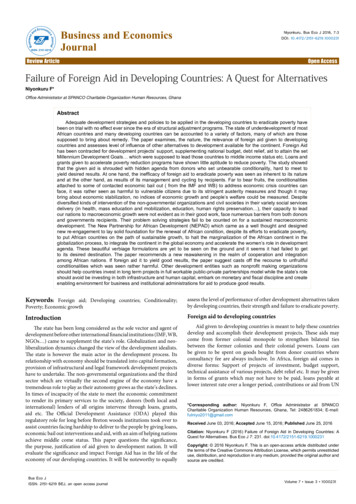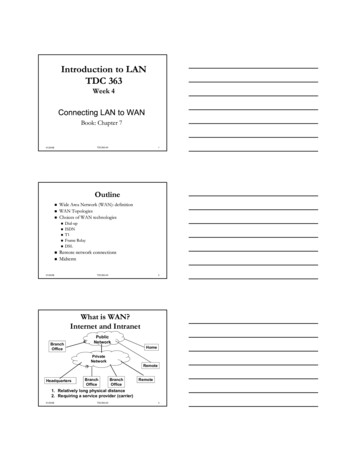
Transcription
Business and EconomicsJournalJournalcssinessBuaEconomindISSN: 2151-6219Niyonkuru, Bus Eco J 2016, 7:3DOI: 10.4172/2151-6219.1000231Review ArticleOpen AccessFailure of Foreign Aid in Developing Countries: A Quest for AlternativesNiyonkuru F*Office Administrator at SPANCO Charitable Organization Human Resources, GhanaAbstractAdequate development strategies and policies to be applied in the developing countries to eradicate poverty havebeen on trial with no effect ever since the era of structural adjustment programs. The state of underdevelopment of mostAfrican countries and many developing countries can be accounted to a variety of factors, many of which are thosesupposed to bring about remedy. The paper examines, the nature, the relevance of foreign aid given to developingcountries and assesses level of influence of other alternatives to development available for the continent. Foreign Aidhas been contracted for development projects’ support, supplementing national budget, debt relief, aid to attain the setMillennium Development Goals which were supposed to lead those countries to middle income status etc. Loans andgrants given to accelerate poverty reduction programs have shown little aptitude to reduce poverty. The study showedthat the given aid is shrouded with hidden agenda from donors who set unbearable conditionality, hard to meet toyield desired results. At one hand, the inefficacy of foreign aid to eradicate poverty was seen as inherent to its natureand at the other hand, as results of its management and cycling by recipients. Far to bear fruits, the conditionalitiesattached to some of contacted economic bail out ( from the IMF and WB) to address economic crisis countries canface, it was rather seen as harmful to vulnerable citizens due to its stringent austerity measures and though it maybring about economic stabilization, no indices of economic growth and people’s welfare could be measured. Despitediversified kinds of intervention of the non-governmental organizations and civil societies in their variety social servicesdelivery (in health, mass education and mobilization, education, human rights preservation ), their capacity to leadour nations to macroeconomic growth were not evident as in their good work, face numerous barriers from both donorsand governments recipients. Their problem solving strategies fail to be counted on for a sustained macroeconomicdevelopment. The New Partnership for African Development (NEPAD) which came as a well thought and designednew re-engagement to lay solid foundation for the renewal of African condition, despite its efforts to eradicate poverty,to put African countries on the path of sustainable growth, to halt the marginalization of the African continent in theglobalization process, to integrate the continent in the global economy and accelerate the women’s role in developmentagenda. These beautiful verbiage formulations are yet to be seen on the ground and it seems it had failed to getto its desired destination. The paper recommends a new reawakening in the realm of cooperation and integrationamong African nations. If foreign aid it to yield good results, the paper suggest casts off the recourse to unfruitfulconditionalities which was seen rather harmful. Other development entities such as nonprofit making organizationsshould help countries invest in long term projects in full workable public-private partnerships model while the state’s roleshould avoid be investing in both infrastructure and human capital, embark on monetary and fiscal discipline and createenabling environment for business and institutional administrations for aid to produce good results.Keywords: Foreign aid; Developing countries; Conditionality;Poverty; Economic growthassess the level of performance of other development alternatives takenby developing countries, their strength and failure to eradicate poverty.IntroductionForeign aid to developing countriesThe state has been long considered as the sole vector and agent ofdevelopment before other international financial institutions (IMF, WB,NGOs ) came to supplement the state’s role. Globalization and neoliberalization dynamics changed the view of the development idealists.The state is however the main actor in the development process. Itsrelationship with economy should be translated into capital formation,provision of infrastructural and legal framework development projectshave to undertake. The non-governmental organizations and the thirdsector which are virtually the second engine of the economy have atremendous role to play as their autonomy grows as the state’s declines.In times of incapacity of the state to meet the economic commitmentto render its primary services to the society, donors (both local andinternational) lenders of all origins intervene through loans, grants,aid etc. The Official Development Assistance (ODA) played thisregulatory role for long before Breton woods institutions took over toassist countries facing hardship to deliver to the people by giving loans,economic bail out interventions and aid, with an aim of helping nationsachieve middle come status. This paper questions the significance,the purpose, justification of aid given to development nation. It willevaluate the significance and impact Foreign Aid has in the life of theeconomy of our developing countries. It will be noteworthy to equallyAid given to developing countries is meant to help these countriesdevelop and accomplish their development projects. These aids maycome from former colonial monopole to strengthen bilateral tiesbetween the former colonies and their colonial powers. Loans canbe given to be spent on goods bought from donor countries whereconsultancy fee are always inclusive. In Africa, foreign aid comes indiverse forms: Support of projects of investment, budget support,technical assistance of various projects, debt relief etc. It may be givenin forms of grants which may not have to be paid, loans payable atlower interest rate over a longer period, contributions or aid from UNBus Eco JISSN: 2151-6219 BEJ, an open access journal*Corresponding author: Niyonkuru F, Office Administrator at SPANCOCharitable Organization Human Resources, Ghana, Tel: 2486261834; E-mail:fulniyo2011@gmail.comReceived June 03, 2016; Accepted June 15, 2016; Published June 25, 2016Citation: Niyonkuru F (2016) Failure of Foreign Aid in Developing Countries: AQuest for Alternatives. Bus Eco J 7: 231. doi:10.4172/2151-6219.1000231Copyright: 2016 Niyonkuru F. This is an open-access article distributed underthe terms of the Creative Commons Attribution License, which permits unrestricteduse, distribution, and reproduction in any medium, provided the original author andsource are credited.Volume 7 Issue 3 1000231
Citation: Niyonkuru F (2016) Failure of Foreign Aid in Developing Countries: A Quest for Alternatives. Bus Eco J 7: 231. doi:10.4172/21516219.1000231Page 2 of 9institutions, IMF, WB or regional banks. For instance, the USA givesits aid to countries to support: State capacity building to strengthensecurity and in conflict management and resolution. Or else, build upbusiness partnership by supporting the generation of demand of USgoods.Nature of foreign aid: The aid is classified in key thematic areas:Investment in people (social welfare provision), environmentalprotection and climate change, support to non-state organizationsinvolved in human development, food security and migration issues,(EC) No1905 [1]. It may come to aid to local population in healthsectors, education, housing and so forth as it is currently the case ofEuropean Union to the people of Burundi. They support civil societyorganizations to promote the atmosphere of good governance andprotection of human rights, protection of natural resources, statebuilding in post-conflict cases; it is also given to support nationalbudget. It can include humanitarian aid meant to offer quick reliefintervention to alleviate suffering infringed by man-made disasters andconflicts.Evolution and views on foreign aidHistorically, foreign aid has received bitter criticisms in thedeveloping countries most especially in Africa. From the 1970’s, thedependency theorists viewed aid as a form of exploitation and selfenrichment: Only the elites become beneficiaries of nationally designedprojected. On the site of the donors, neoliberals saw in Aid an extortionof resources, a long earned asset being dashed to impoverished nationsincapable of making a best use of it to effectively come out of poverty. Inthe 80’s, conditions upon receiving aid were introduced, which in mostcases were related to institutional reforms, good economic policies.The Washington consensus introduced the Structural AdjustmentPrograms (SAP) loans to deal with inefficiency of the state. ThisConditionality was later viewed as rather hampering with sovereigntyand dignity of countries because of their coercive nature. Jane and Toye[2] saw foreign aid as not only inefficiency to reduce poverty, but asmeans to foster dependency. In the 90’s the wind of neo-liberalism ofeconomy postulated that the world should go Democracy and any stateought to embark on political reforms making institutions as democraticas possible where good governance, respect of human rights and alikewere favorable conditions that could make development and reliabilitypossible. The political orientation of the country could determine howmuch aid it could receive. Aid could therefore be given to countriesgoing aboard the way of electoral reforms, multiparty system and anyother political act advocating democratic atmosphere. These aids werealso given to nations coming out of long times of conflicts to strengthenpeace building in the country, supporting electoral processes or toempower new political formation and civil society organizations. Otherfactors that could attract aid were prevailing security threats, not onlybecause they destabilize the nation’s ongoing development projects,they also derail donors’ interest in developing countries. Countriescan be easily supported to deal with criminal activities such as humantrafficking, cross boarder organized crimes, environmental threats,mainstreaming of gender which are normally connected to poverty [3].United Nations general assembly came to realize that some parts ofthe world were still in abject poverty and the assembly adopted theMillennium Development Goals (MDGs) that could be summed up in8 specific objectives: The focus on primary universal basic education,eradication of poverty and hunger, reduction of children mortalityand maternal health, combating communicative diseases (HIV-AIDS,Malaria) ensuring environmental sustainability and strengtheningof partnership among nations. These goals were to be endorsed andadopted by all nations and approved by the donor community. In 1969the DAC later adopted the Official Development Assistance (ODA)to standardize the measurement of the source flowing from the DACgovernments donors to developing targeted countries. Besides thesewell-structured donor agencies, we have private contributors givingloans in forms of bilateral cooperation. The selection of recipients aremostly based on set indicators , poverty status, political situation, levelof respect of human right [4].Failure of foreign aid in alleviating poverty in developingcountriesIn most cases, the aid in forms of economic bail out has beenseen as a form of economic exploitation and defective as it tends torather deteriorate existing economy as in the IMF-related fiscal targetalways compel the recipient to adopt measures with harmful effectsat a long run. In the course of the loans processing, conditionalitysuch as government’s withdrawal in social services delivery, hindersgovernment services’ expansion and so therefore productivity.Workers are only contracted on part-time basis without being onpayroll. As the aid does not come all at once, there is always lacunain its efficacy. Delays in implementation of projects are due to aid’svolatility and unpredictability. It fails have a positive impact as can’tbe used for a long term investment. Carlos and Nicholas, assert thatas it pass through a lengthy bureaucratic process where corruption,mismanagement and misuses make the given aid quite useless. TheIMF-based aid retrenches the operation of the public sector by freezingpublic sector hiring, the retreat ratio increases and social services areNGOized while basic social services delivery are put in hands of privatebusiness entities and by so doing, do increase poverty and suffering ofthe poor who can’t afford social services any more. This raises the antistate sentiment when new political formations are dictated by a neweconomic order.Foreign aid seen as exploitationForeign aid and agenciesAbundant theories and literature list numerous sources of failureof Foreign Aid but most of them converge on the fact that, ForeignAid are short term interventions lacking lasting sustainable impact.Some of these blame the world economic structure where LDC are putin perpetual dependency. A mixture of internal and external factorsmakes aid not be geared towards people’s welfare but a long term gainfor donors. African political economy is a product of western imposedmodels and ideologies. My candid view remains, African nations’development may still depend of the willingness of the world powers togive space to nascent economies on their own, or simply depend on thewillingness of development nations to set priorities and agenda aimedat standing on their own to design their own fate.After the Marshal Plan which was meant to support Europeancountries after the World War II, on 13th January 1960 was bornthe Development Assistance Committee (DAC) grouping donorcountries to offer consultancy platform in regards to Aid. It mergedlater with other development agencies to form the Organizationfor Economic Cooperation and Development (OECD). The 2000Foreign Aid has always been the last resort of most Africannations as its acquisition has not demonstrated much laudable andcommendable outcome and here goes the saying that, between twoevils, the lesser is preferred. As Morrison [5] noticed, Foreign Aidcan only be beneficial if it can positively affect the investment, makesit possible for countries to import capital goods or technology andBus Eco JISSN: 2151-6219 BEJ, an open access journalVolume 7 Issue 3 1000231
Citation: Niyonkuru F (2016) Failure of Foreign Aid in Developing Countries: A Quest for Alternatives. Bus Eco J 7: 231. doi:10.4172/21516219.1000231Page 3 of 9does not directly affect the savings rate. Many scholars converged onsome factors making Foreign Aid not to work in developing nationsespecially in Africa: McGillivrray et al. [6] state that it decreasesreturns as it is mostly heavily influenced by external conditions andalso, its relevance in the overall economic growth depends upon thenature and performance of political institutions in place. ForeignAid is normally contracted for specific reasons: promoting long termeconomic growth and poverty reduction, to promote the short-termpolitical interests.for Ali A.A.G [7] Foreign Aid remains unfavorableand ineffective as it remains volatile: The mode of disbursement is toolengthy and cumbersome and hence, the country fails to meet the timeconstraints projects have to take before completion. [8] affirms that theunpredictability of aid flows does not bolster good governance in noway; it hinders coherent government expenditure, or the developmentof sound institutions’ accountability in recipient countries. In Ghana asin many African countries, the history of Foreign Aid showed a relativefiscal stability at the expense of employment at the era of StructuralAdjustment Programs. [9] showed how, despite the long relationshipwith the IMF, the country remained solely dependent on cocoa andgold export. Its recourse to IMF loans where mostly in times of fiscaldeficit, high exchange rate and inflation, increased debt and borrowingmaking the government unable to stabilize the economy.Elsewhere, though Foreign Aid could increase the access to socialamenities and services, such as a relative rise in school enrollmentfor the basic education and health, this could not follow the increaseof facilities and quality of services in those facilities. In some studiesmade, [10] saw that it can only stabilize deteriorating poverty but notimprove the situation, simply because it can take a longer time beforethe impact can be felt. Experiences however differ in many nations asAid is meant to solve diverse problems but in most cases, its volatilityand unpredictability makes it difficult for countries to factor it intolong term spending plans and include it in budgets and therefore, itsefficiency is questionable. In their study, Pycroft and Marthis [11]showed how donors may prefer to release their funds to solve problemsother than the sectoral priorities set by the governments where thesefunds are highly managed by their own experts and or by independentNGO’s which are merely implementers of already designed projects.Funds meant to help governments achieve its mandate to combatpoverty and alike may be directed by foreign policies of hiddeneconomic or political agenda whereas, they must be subjected to adhereto conditions hard to meet, meant to enable its best utilization. Goodsignals of good governance, liberty and freedom of the citizens, securityand human rights, constitutionally laid down governing systemallowing participation and democratic institutions to operate; are thosedependant variables if trespassed can result into freezing, withholdingor withdrawal of aid. One may now ask if we still need foreign aidand in case we don’t, what can be the alternative of our so dependanteconomies suffocated by both endogenous and exogenous factors.Conditionality and its real impact on aidAlong history, Foreign Aid has been viewed in different anglesby both recipients and donors: In 70s it was criticized to be a form ofdomination and exploitation as it always fall in the hands of unpreparedgrounds, in the hands of leaders with no real vision, weak institutionsand corrupt officials. In 80’s , with the rise of neo-liberalism, ForeignAid was seen as harmful to local economies and the WashingtonConsensus came with unbearable conditionality hard to be met. In 90’s,these Conditionality whose greater part was to obstruct any socialistpolicy formation in the countries under development, they imposed ademocratic regime with a full capitalist economy. This also led to theBus Eco JISSN: 2151-6219 BEJ, an open access journalformation of political parties and allowed competition on the politicalscenes to gain power [12]. This was meant to deny over tenure on powerand a possible dictatorship which could hinder development and doaway with western interest. It was toward the end of this period thatwe had nascent issues of security, like terrorism that drew attention ofdonors on matters concerning migration, etc. After this era, the worldeconomic crises made poorest countries to be highly indebted and theLondon Club had to persuade creditors to be conscious on aid andimpose Conditionality to countries receiving Foreign Aid so that theymay put in place measures that could make it possible for them to payback [13]. This Conditionality was seen as substitute of collateral assetsas donors ensure that there is a clear and sound economic policy whichwill enable aid yield fruits. Other analysts saw them as safeguard tomoral hazards. This could be more frustrating when donor countriessend their own experts to monitor the usage and usefulness of the aid topersuade and encourage the implementers to adhere to pre-establishedagreement. Though this can be a way of ensuring being paid back, ithas been also a way of imposing economic policy to countries as manyname it imperialist way of keeping a hand on the management of affairsof other nations for their own gain [14]. Despite this bitter criticism,Foreign Aid, if well utilized, Rodrik [15] saw that it can improvedomestic economic policies by inducing consistent flow of income overtime. Here is the justification.Justification for conditionalityAid is always given under Conditionality whose acclaimed aimis to ensure effectiveness in resolving problems for which they wereto resolve. This aid can be withheld, removed or cancelled in timesof trespasses or failure to adhere to Conditionality which are seen assine qua none factors making aid yield results. Among many of these,good governance and the rule of law have been identified as fertilegrounds where aid could produce good fruits. Simply because theconducive political environment can foster accountability, formulategood policies which enable transparency and practice of human rights,respect of legal foundation of the state , constitutions and other politicalgoverning precepts. It is a view that such an institution can offer agood environment for business and facilitates investment and protectsinterest of the people and their properties. In 1990’s France warned itspartners to forcibly democratize institutions as they sought to enhanceinstitutional strengthening more especially in electoral processes andother institutional arrangements capable of making reforms possible.Failure of Foreign Aid’s conditionality to reduce povertyAgain, imposed conditionality has demonstrated a very minimalimpact on policies. The Foreign Aid which is a disputed form ofdomination by some people was seen as ineffective when, it falls intowrong and poor programs and policies, where there is poor or lackof monitoring mechanisms from donors to avoid principal agentdilemma. The other non-negligible factor is the ownership of policies.If suggested policies are from political leaders who are the sameimplementers, there is likelihood that the aid yield fruits. But, if thepolicies are a form of imposed programs, it may not match with therealities and the needs on the ground, which will eventually result intofailure of aid. To be successful, there should be coherence betweenthe donors’ plans of actions and what the country aspires to achieveas objectives because the two may be conditioned by different drivers.This often happens in rural development projects where programs aredrafted in high offices with less or no real a priori research to determinewhat is really needed by beneficiaries as they are not involved in policyelaboration. Other factors may come from global current economicand political situations where new measures (health, security andVolume 7 Issue 3 1000231
Citation: Niyonkuru F (2016) Failure of Foreign Aid in Developing Countries: A Quest for Alternatives. Bus Eco J 7: 231. doi:10.4172/21516219.1000231Page 4 of 9environment) may need to be imposed to nations for the general good.One of the other factors occasioning failure of the aid is that theyresolve existing problems and fail to dig deep and tackle the grassrootsissues. On one hand, conditionalities’ positive impact can be good onlywhere aid is meant to tackle a real problem the society is facing. Onthe other hand, the non-adherence to conditionality may hinder theperformance of aid especially when it is aimed at reducing poverty.The question here is easy to answer. If Foreign Aid is something thathas been in operation since 70’s what accounts for the current state ofpoverty of nations that have been receiving aid over several decadesnow? Part of the answer is, the aid always falls into unpreparedgrounds, and donors do not care about pre-donation situation but caremuch about post-donation periods. Burnside and Dollar [16] assertthat it can only spur growth if it is channeled through well-establishedeconomic systems allowing its best use. They add that aid can only havepositive impact on growth in developing countries which have adoptedgood fiscal, monetary, and trade policies, otherwise, the acquisitionof aid will compel those systems to install first sanity in fiscal andmonetary policy. In the presence of poor policies, aid has no positiveeffect on growth whatsoever. As any other pro neoliberal theorists,the government whose concern remains on social welfare provision(Education, health, housing ) may not meet the target as theseservices remain unproductive, but mere government expenditures.Most scholars do not commend Foreign Aid as they qualify it asimpediment and intrusive in as much as their positive impacts remainunmeasured. For them, unless it is contracted to accomplish alreadystarted projects, it rather weakens feeble state’s ability to deliver unlessit supports ongoing state-owned, negotiated and implemented oneswith no conditionalities.How foreign aid can be beneficialIn relation to growth, aid is not always to be seen as useless thoughwe still need to investigate where it has ever shown good outcome.Lipton, Toye and Cassen [17] made it clear that, though it may not bringabout growth, it may help in poverty reduction. It may also increase thecash flow without benefiting directly the needy ones. Where ForeignAid seemed to create much impact was where it was linked to projectsaiming at attaining the Millennium Development Goals or supportingnational budgets or used for public investment.Hassan [18] argued that, foreign aid is not evil in itself to our Africaneconomies. It must only support existing started projects, increaseimport, technology transfer and strengthens national currency, lowerinflation and minimize devaluation of the economy. Rather than cuttingdown the expansion of provision of social welfare services, it has ratherthe obligation to make its provision more inclusive and extensive asmany rural African zones still needs government’s intervention to raisethe leaving standards up. Unlike other scholars, he thinks these aidsshould rather be meant to improve social services as an investment inpeople will be more beneficial to our nations rather than investmentin areas where benefits are shared among a few elite. The aid that isnot meant to improve infrastructural constraints, to improve theleaving standards of the poor rural zones still living on rudimentalagriculture of substance, the foreign aid which is not addressing theissues agriculture today, aid which is not meant to reduce povertyby implementing people-centered projects, empowering the lives ofthe marginalized citizens, aid which will not lead to macroeconomicdevelopment would eventually lead to a failure because the cause ofour lagging behind would not have been touched.Conclusively, Foreign Aid can only yield results when it isBus Eco JISSN: 2151-6219 BEJ, an open access journalconsecrated to improve lives of the poor ones through variety ofempowerment programs (both for woman, unemployable youth andvulnerable). It should help the government generate employmentwhich will increase their living standards and the level of consumption.It can have positive impact when it facilitates technology transfer,invest in research and high education, build strong competitive marketand freedom of all sorts to create enabling environment for investors.Where things have been better, loans and grants were able to facilitatethe expansion of small scale businesses, credit unions, microfinance,savings and loans institutions, agricultural cooperatives in rural areasand many more services empowering the most impoverished, but alsosupporting nascent development third sectors’ development projects.To some extent, the foreign aid should not attract any conditionalitythat will make the poor poorer and rich, richer. It should be given andforemost, be contracted when it is most needed and not be taxable andimpose external conditions which are likely to make it fruitless.Other Alternatives for Poverty Alleviation in AfricaIMF loans and bail out: OverviewIMF loans are financial assistance contracted by a countryexperiencing economic hardship beyond its ability to manage. Theycome in forms of short-term loans aimed at doing away with financialdeficits. The contracting parties agree on some conditionality uponreception of the funds, whose main purpose is the guarantee itsusefulness and the ability of the contracting country to pay back. Theyare measures imposed to the countries laying down economic policiesmeant to readdress the situation that led to the need of borrowing.Fiscal policies are imposed compelling the government to reduce publicspending and borrowing: It is in most cases cutting down number ofsubsidies, privatizing the social services delivering institutions, etc.African governments have been contracting these loans seen as harmfulto the overall economy by most researched made, though it has beenthe necessary evil in some cases.Let’s remind that the IMF and the World Bank, in their earlyconception, worked on the quota contributions from membercountries. Each country had to pay to the fund according to a quota.This fund constitutes the basic source for loans to country membersin order to correct balance of payment issues. Different types of loansfrom the IMF are linked to the size of national quota measured onthe basis of a formula which includes the country’s national income,foreign exchange reserves, size and fluctuation of its foreign trade,export dependence and many more factors [19]. The sum the countrycan take away from the fund is determined by its quota. The first 25%is not subjected to any conditionality but the remaining three must betaken after a standby agreement has been signed and this agreementconsists of the Fund’s directives to put in place and implementstabilization program called conditionality at times going along withauthority measures to foster fiscal discipline. The Fund later establishedthe Extended Credit or Fund facility (ECF/EFF) allowing countriesto draw beyond its quota up to 3 years if it is able to implement aneconomic stabilization program agreed by the Fund and adhered toperformance criteria.The IMF loans are seen as funding programs that comes in timesof
our nations to macroeconomic growth were not evident as in their good work, face numerous barriers from both donors and governments recipients. Their problem solving strategies fail to be counted on for a sustained macroeconomic development. The New Partnership for African Deve











